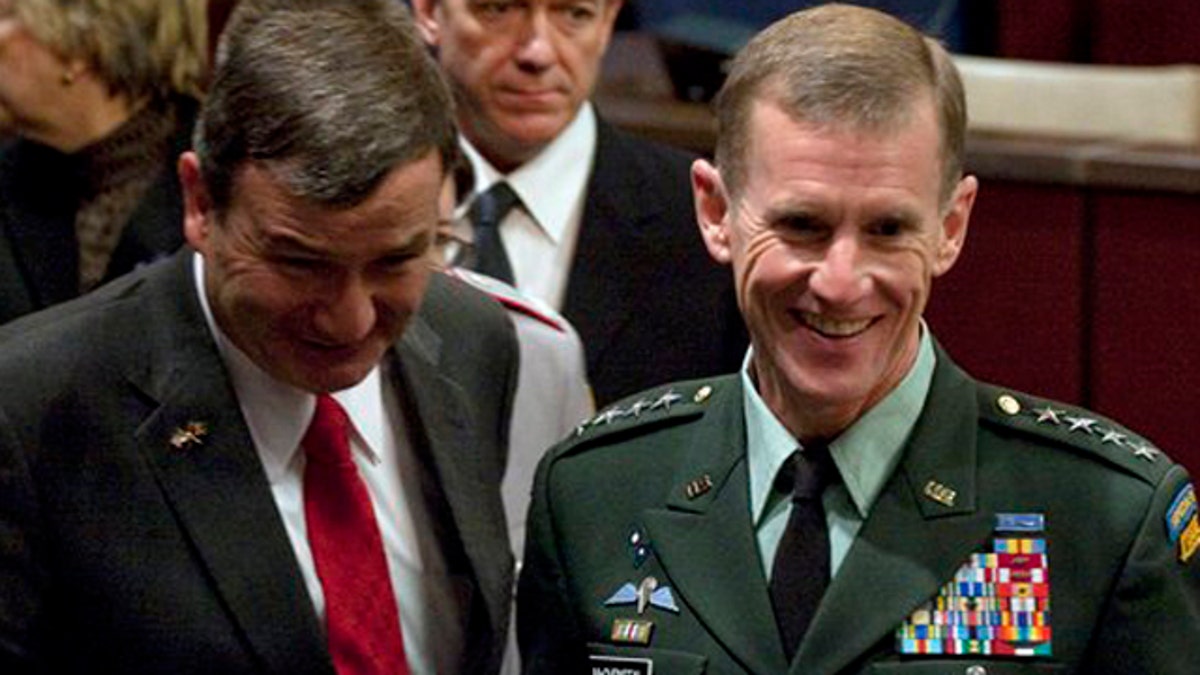
Ambassador to Afghanistan Karl Eikenberry, left, and Army Gen. Stanley McChrystal before giving testimony assessing the results in Afghanistan to the House Armed Services Committee, Tuesday, Dec. 8, 2009. (AP)
WASHINGTON -- Challenged on whether the surge timeline is "truly dependent on conditions on the ground," the top commander in Afghanistan told a House panel Tuesday that if more troops are needed, he will request them.
Asked whether he would advise not removing troops from combat if operations are going poorly in July 2011 -- President Obama's announced date for a drawdown -- Gen. Stanley McChrystal said he doesn't want to speculate on what the situation will be in 18 months.
But he said, "I will always provide my best military advice" and if conditions warrant, he would recommend more troops.
But McChrystal also announced with confidence that the U.S. strategy in Afghanistan before that time "will absolutely be successful," as he reaffirmed his support for Obama's plan to send 30,000 additional troops to Afghanistan.
He said it will be clear to that nation's people by 2011 that the Taliban cannot win.
"Our mission is to help the government of Afghanistan with the ability to protect its country," McChrystal told committee chairman Rep. Ike Skelton, D-Mo.
McChrystal said the July 2011 drawdown date is not a "major factor militarily" for U.S. strategy in Afghanistan.
"At that time the president has said we will begin to draw down, but we will decide the pace of that. It's not a deadline at all, but a part of evolution of what we're doing," he told the House Armed Services Committee.
He added that the U.S. military will seek to "provide (the Afghans) with the time and space it needs to fend off the Taliban."
Obama's plan also got the endorsement of U.S. Ambassador Karl Eikenberry during Tuesday's House and Senate hearings, who had previously expressed misgivings about the war.
Eikenberry said at the hearing that he supports the new war strategy for Afghanistan and is united on the effort with McChrystal.
"I want to underscore at the outset that Gen. McChrystal and I are united in a joint effort in which civilian and military personnel work together every day," Eikenberry said in a statement prepared for the hearing.
"We need a viable Afghan government so our forces can draw down," he said.
"In spite of everything we do, Afghanistan may struggle" to take over its own government, he warned. But he stressed the American efforts to develop Afghan industry, farming and infrastructure.
"This all has to be underpinned by Afghan leadership," Eikenberry said, citing Afghan President Hamid Karzai's recent commitment to fight corruption in the government.
McChrystal told lawmakers that the military will continue to work to win the support of the Afghan people, and he said he believes the NATO coalition will not be viewed as foreign occupiers intent on staying in the country, but rather as allies interested in bolstering Afghan strength.
McChrystal called Usama bin Laden an "iconic figure" whose very survival eight years after the Sept. 11 attacks serves as a recruiting tool for Al Qaeda.
"I don’t think we can finally defeat Al Qaeda until he is killed," McChrystal said.
When the new strategy for Afghanistan was being devised, Eikenberry questioned McChrystal's plan for a troop buildup and urged the Obama administration to step cautiously in planning an escalation amid questions about corruption and mismanagement problems in Karzai's administration.
But he began his testimony Tuesday by stressing that he's on board with Obama's new strategy.
"The course he outlined offers the best path to stabilize Afghanistan and to ensure Al Qaeda and other terrorist groups cannot regain a foothold to plan new attacks against our country or our allies," Eikenberry said. "I fully support this approach."
Skelton said at the outset that he differs with statements comparing the Afghan surge with the United States surge in Iraq, saying that as a percentage of the total number of forces, the 30,000 or so authorized by Obama last week was a much higher proportion of deployment than was the case when former President George W. Bush sent additional trips into a surge in Iraq.
"What risk are we accepting in the next 18 months and how can we mitigate it?" Skelton asked. He said he believes that "ultimately, we are protecting the American people" from Al Qaeda.
Fox News' Jessica Weinstein and The Associated Press contributed to this report.




